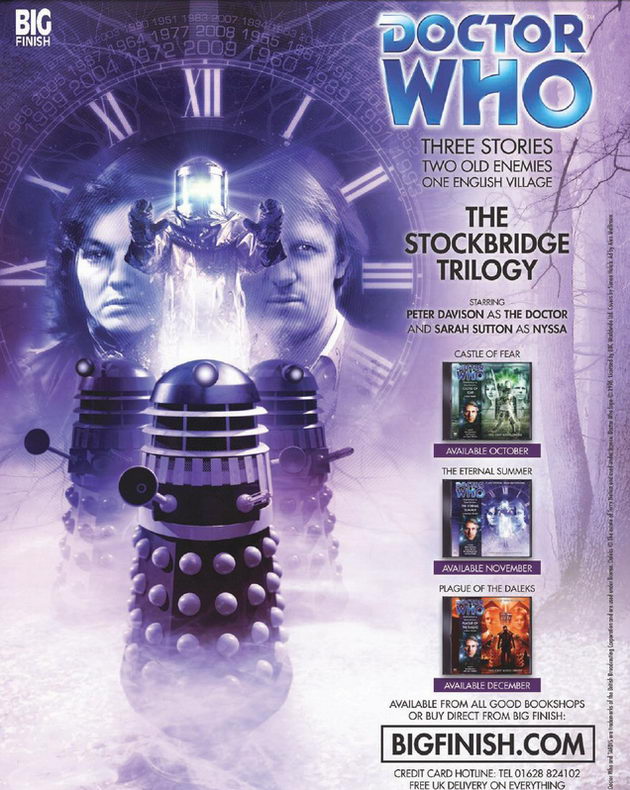|
| |
|
STORY PLACEMENT
THIS STORY TAKES AFTER THE BIG FINISH AUDIO "THE ETERNAL SUMMER" AND PRIOR TO "THE DEMONS OF RED LODGE AND OTHER STORIES."
PRODUCTION CODE 6C/P
WRITTEN BY MARK MORRIS
DIRECTED BY BARNABY EDWARDS
WORKING TITLE
RECOMMENDED PURCHASE BIG FINISH CD#129 (ISBN 1-84435-432-0) RELEASED IN DECEMBER 2009.
BLURB Stockbridge used to be such a lovely place. The loveliest village in all England, according to the guide books. But hardly anyone visits Stockbridge now: a few tourists, a couple of Trust guides, the odd beady-eyed raven.
But something is coming to Stockbridge. Something which turns village cricketers into ravening zombies – a plague such as the Earth has never seen, falling through history from a time when humanity's greatest enemy was a race known as the Daleks.
The Doctor and Nyssa visit Stockbridge for the final time, to confront the terrible secret buried at its heart. The storm clouds are gathering…
|
|
|
Plague of the Daleks DECEMBER 2009 (4 EPISODES)
The final chapter of the “Stockbridge Trilogy” is, as one would expect, by far the darkest Mark Morris’s (Forty-Five) play tells of the ruin of Stockbridge in the far future; of the sun-scorched Earth’s last perfectly-preserved English village falling to ravening, plague-ridden zombies and their monstrous, metal-cased masters.
I love the conceit that, despite being the Stockbridge of the future, the Stockbridge of this story is still recognisably the quintessential English village that it was when we last saw it in our time. Preserved as a heritage site, the future Stockbridge is an attraction that draws life forms ranging from humans with an interest in genealogy to purple-tentacled and really quite pompous alien professors. I also like the notion that the village is, essentially, one big Doctor trap. The Daleks have been playing a long game, sleeping beneath the village, waiting for the Doctor to arrive at his favourite haunt so that they can unleash their mutant plague and finally rid themselves of the meddling Time Lord - by making him on one of them.
This story’s working title, Village of the Damned, would have been a far more effective moniker in my view, dramatically speaking. Whilst Plague of the Daleks certainly does what it says on the tin, and no doubt will drum up a few more sales for Big Finish pre-release than Village of the Damned would have done, it gives away not only the presence of the Doctor’s oldest foes but also the crux of their fiendish plan. And unlike many Dalek stories, this is one where their unmasking at the end of the second episode would come as a genuine surprise had it not been spoiled beforehand.
“Sensory data indicates that after initial resistance the Doctor’s physiology is succumbing to cellular subjugation... Soon the Doctor will be a Dalek and the Daleks will reign supreme!”
This small gripe aside, Morris handles the Daleks tremendously well in his script, and - of course - Nicholas Briggs does his customary job of realising them magnificently, aided and abetted by Steve Foxon’s typically effectual sound design. In fact, I don’t think that I’ve come across as distinctive a bunch of Daleks since Briggs’ brought Sec, Caan, Jast and Thay to life on television. Whether they’re begging for their own extermination because they’re blind and thus useless, invading the TARDIS, or being drawn into atypically long-winded debates with their victims-to-be (Professor Jabery’s foolhardy defiance is teeth-clenchingly painful), the Daleks of this play are as imposing as ever.
Sarah Sutton also enjoys another in what is fast becoming a long line of strong outings for her character. Here Nyssa is paired with Liza Tarbuck’s (The Infinite Quest) tour guide, Lysette Barclay, and charged with driving the narrative forward. At times, particularly when the Doctor falls under the Daleks’ influence in the second half of the story, Nyssa is firmly in the ‘Doctor’ role and – much to my surprise – up to the job. Peter Davison is equally well-catered for though: here he is given the opportunity to spar with Keith Barron (Enlightenment) once again, not to mention play a Doctor slowly succumbing to Dalek control as the very cells of his body turn against him.
My favourite characters of the play though were a couple of the red shirts – amiable old genealogist Vincent Linfoot (Barry McCarthy) and his dragon of a wife, Alexis (Richenda Carey, who sounds uncannily like Maureen Lipman of The Idiot’s Lantern fame). For me, it’s ‘little’ characters like these that make the first two portentous episodes work as well as they do. Morris’s plague rain may well be a horrific idea in principle, but without losing a character that we care about to it, it wouldn’t have worked half as well. In fact, Vincent’s ghastly transformation is one of the play’s most harrowing moments.
The play’s final episode is devastating and dazzling in equal measure; I really didn’t expect to be as moved by it as I was. Plague of the Daleks is littered with references (both subtle and sledgehammer) to the village’s past – Mrs Withers, the Sinclairs, Sir Justin, even the phrase “The Tides of Time” -, making the trilogy’s dénouement all the more affecting, as well as affording it a lovely sense of history and permanence. The Doctor’s bookend recitals of Oliver Goldsmith’s poem The Deserted Village - the former delivered with gusto, the latter dripping with remorse - only heightens the poignant feel.
This final ‘season’ of 2009 has proven my firm favourite, which really is saying a lot given the quality of the first three. Indeed, this year’s ‘seasonal’ release schedule – which I’m very pleased to see is being maintained for at least the first half of 2010 – has allowed Big Finish to tell broader, deeper and ultimately much more compelling stories, and I really have to applaud that. Each story arc this year has felt ambitious and modern, yet still indisputably Doctor Who. And that’s why I keep listening to Big Finish.
Now – where can you buy copies of The Tides of Time?
|
|
|
Copyright © E.G. Wolverson 2009
E.G. Wolverson has asserted his right under the Copyright, Designs and Patents Act, 1988 to be identified as the author of this work. |
|
|
Unless otherwise stated, all images on this site are copyrighted to the BBC and are used solely for promotional purposes. ‘Doctor Who’ is copyright © by the BBC. No copyright infringement is intended. |
|

.jpg)


